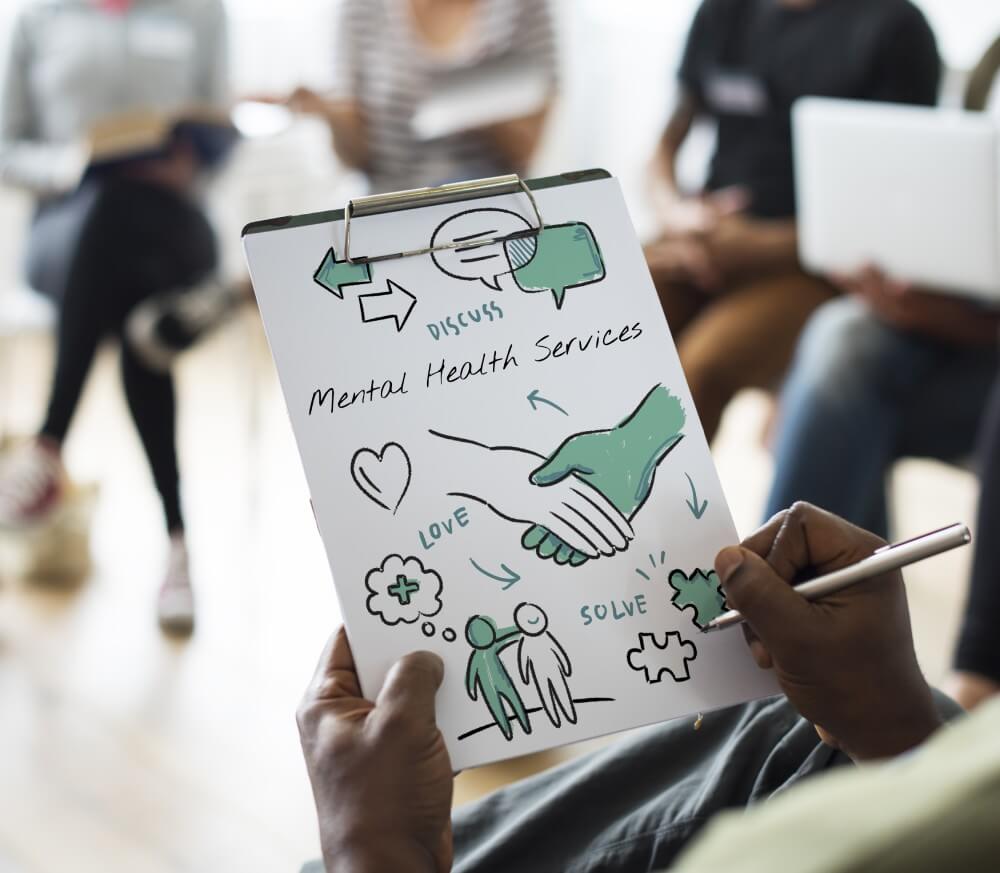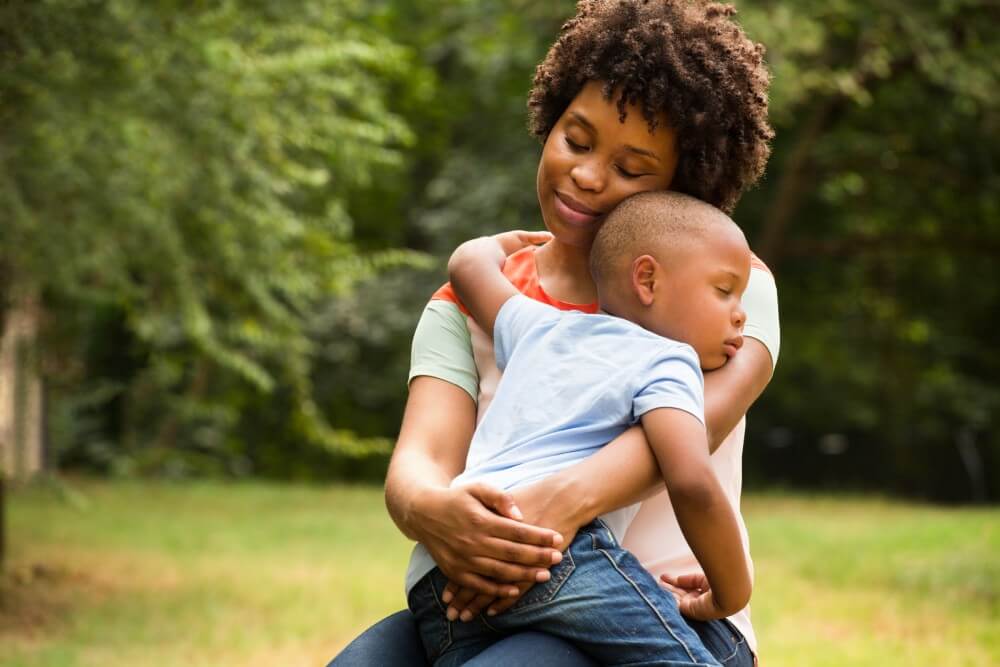At NYC Health + Hospitals, we recognize domestic violence as a public health issue. Our doctors, nurses, psychologists, psychiatrists, domestic violence coordinators and sexual assault response team members are here to help.
We Are Here for You. Get the Confidential Support You Deserve.
The NYC Health + Hospitals Mental Health Team at the Family Justice Center (FJC) was created to provide treatment and support to survivors of domestic violence, intimate partner violence (IPV), sex trafficking and other gender-based violence. Our psychiatrists, psychologists and social workers will help you overcome your mental health symptoms.
Download flyer

The Family Justice Centers offer free, confidential help to people of any:
Age | immigration status | sexual orientation | income | language spoken | gender identity | disability
Domestic and Intimate Partner Violence and Mental Health
The impact of IPV affects survivors differently. Many IPV survivors experience mental health concerns such as major depression, severe anxiety and post-traumatic stress disorder (PTSD). Other survivors also struggle with drug and alcohol abuse in order to cope with their challenges.
How Domestic and Intimate Partner Violence Affects Your Mind and Body
- Feeling tired. Feeling stressed out. Low motivation. Low self-esteem.
- Pain in the chest. Stomach pains. Pelvic pain. Choking sensations.
- Feeling anxious. Worrying a lot. Feeling paranoid. Zoning out.
- Difficulty sleeping. Not wanting to be alive.
Signs and Symptoms of Power and Control in Domestic and Intimate Partner Violence
If you are experiencing the following from a spouse or partner regularly, get confidential help from the NYC Health + Hospitals Mental Health Team at the FJC.
Coercion and threats: Threatening to hurt or leave you. Making you drop charges. Threatening to report you to welfare.
Intimidating you: Making you feel afraid. Destroying things. Abusing pets.
Emotional abuse: Calling you names. Playing mind games. Making you feel guilty.
Using isolation: Controlling what you do. Controlling who you see and talk to. Controlling where you go.
Denying and blaming: Not your concerns about abuse seriously. Saying it didn’t happen. Saying you caused the abuse.
Using children: Making you feel guilty about the children. Using the children to relay messages. Threatening to take the children away.
Using male privilege: Treating you like a servant. Making all the big decisions. Acting like the master of the castle.
Financial abuse: Preventing you from getting or keeping a job. Making you ask for money. Taking your money.
Foreign Language and Interpretation Services
Telephonic interpretation is available in more than 240 languages.
NYC Family Justice Center Locations
Please call Monday – Friday, between 9 a.m. and 5 p.m.
To find a Family Justice Center, click here.

Bronx
(718) 508-1220
Brooklyn
(718) 250-5113
Manhattan
(212) 602-2800

Queens
(718) 575-4545
Staten Island
(718) 697-4300
Are You in Danger?
If you are in immediate danger, call 911.
If you can’t talk, text 911.
Learn more: nyc.gov/text911
To get connected to immediate safety planning, shelter assistance, and other support and resources—24 hours, 7 days a week: Call NYC’s 24-hour HOPE Hotline at: 1-800-621-4673 (HOPE)
If you are concerned about your mental health or the mental health of others, call 1-800-NYC-WELL.
Find resources and support in NYC by searching the City’s NYC HOPE Resource Directory at www.nyc.gov/NYCHOPE.
Services Available at NYC Family Justice Centers
Based on the assessment by the domestic violence coordinator, the patient may be referred to an NYC Family Justice Center in their borough where they can receive legal assistance, case management and safety planning, job training and referral and services for their children. However, victims do not need a referral. Any New Yorker can simply walk into the FJC’s to access services.
NYC Family Justice Centers can help you with:
- Planning for your safety
- Mental health and counseling services to support emotional well-being for you and your family
- Referrals to education programs, including workshops to help with budgeting, credit repair and English as a Second Language (ESL) classes
- Meeting with trained law enforcement, such as NYPD, NYC Sheriff’s Office and District Attorney’s Office
- Applying for shelter, housing and other support services
- Information about public benefits and job training programs, including help with resume writing and interviewing skills
- Legal consultations for orders of protection, custody, visitation, child support, divorce, housing and immigration. Legal representation is not guaranteed.
- Childcare for children age 3+ while you get services on-site.
If you, or a loved one, is a victim of domestic violence, we are here to help you.
Domestic Violence Coordinators
Specially trained domestic violence coordinators are on staff throughout the health care system to work with patients who are victims of intimate partner abuse, elder abuse or sex trafficking. Patients are referred to the coordinators by a member of their health care team. The coordinators provide screening, referrals, documentation of injuries, photographs of injuries if the patient wants that service and help in developing a safety plan. Once the patient leaves the hospital or doctor’s office, the coordinator follow-ups within a week to offer additional help if needed.
Services in the Emergency Department
Many victims of domestic violence enter the health care system through the emergency department. When a patient confides that they are a victim, their service is expedited, and they are immediately taken out of the waiting room and brought to a safe space in the hospital. They receive medical treatment, a social work assessment, help in filling out a police report if they want to and safety planning.
Sexual Assault Response Teams
If a sexual assault occurs during domestic violence, patients are seen by specially trained teams of experts, including forensic examiners and rape crisis counselors. The forensic examiners properly identify, collect and store forensic evidence and document injuries. Rape crisis counselors are specially trained to help victims through the emotional trauma of a sexual assault.